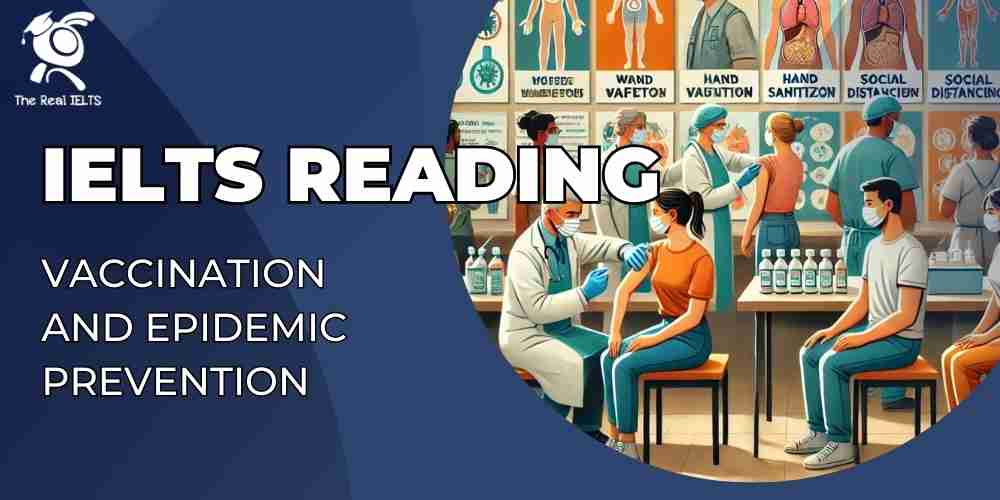IELTS Reading 29: Vaccination and epidemic prevention là chủ đề thuộc chuỗi bài luyện tập 11 dạng bài IELTS Reading và các bài tập luyện tập.
Học lại bài cũ: IELTS Reading 28: Cancer treatment possibilities.
IELTS Reading: Vaccination and epidemic prevention
Stress is a natural response to challenging situations and is an unavoidable part of life. However, prolonged or chronic stress can have serious effects on an individual’s physical and mental health. Modern society has seen a rise in stress levels due to a combination of factors such as work pressures, financial difficulties, social media, and the demands of maintaining a fast-paced lifestyle. Understanding the impact of stress on health is crucial, as it can help individuals take the necessary steps to manage stress more effectively and avoid long-term health complications.
The Physiology of Stress
When a person encounters a stressful situation, the body responds by releasing stress hormones like adrenaline and cortisol. These hormones prepare the body for a “fight or flight” response by increasing heart rate, elevating blood pressure, and boosting energy supplies. While this response can be beneficial in short bursts, it can become harmful if triggered too frequently or over extended periods.
Chronic stress keeps the body in a state of heightened alert, which can lead to a range of health problems. Studies have shown that long-term stress is associated with cardiovascular issues, including heart disease and hypertension. The constant release of stress hormones can cause damage to blood vessels and increase the risk of heart attacks and strokes.
Mental Health Implications
Stress not only affects the body but also has profound effects on mental health. Anxiety and depression are often linked to high levels of stress. The pressure to meet deadlines, fulfill personal and professional obligations, and deal with everyday challenges can lead to feelings of overwhelm. Over time, this can result in burnout, a state of emotional, mental, and physical exhaustion.
Sleep disturbances are another common consequence of stress. Many people find it difficult to fall asleep or stay asleep when they are under stress. This lack of restorative sleep can exacerbate the problem, as sleep deprivation further increases stress levels and impairs the ability to cope with challenges.
Immune System and Digestive Health
Stress also weakens the immune system, making individuals more susceptible to infections and illnesses. Research has shown that people experiencing high levels of stress are more likely to catch colds or other viruses, as their immune response is compromised. In addition, stress can aggravate existing conditions such as asthma or autoimmune diseases, where the body attacks its own healthy cells.
Digestive problems are another area where stress can wreak havoc. Many people experience symptoms such as stomachaches, nausea, or indigestion when they are stressed. Stress can disrupt the balance of bacteria in the gut, leading to inflammation and conditions like irritable bowel syndrome (IBS). This can create a vicious cycle, as digestive discomfort can contribute to even higher levels of stress.
Coping with Stress
Given the serious health risks associated with chronic stress, it is essential to develop healthy coping mechanisms. Exercise is one of the most effective ways to manage stress, as physical activity reduces the production of stress hormones and triggers the release of endorphins, the body’s natural mood elevators. Regular exercise also improves cardiovascular health, sleep quality, and overall well-being.
Mindfulness practices, such as meditation and deep breathing, can also help reduce stress by encouraging relaxation and promoting a sense of calm. These techniques allow individuals to focus on the present moment, breaking the cycle of anxious thoughts that often accompany stress. Furthermore, social support is crucial in managing stress. Talking to friends, family, or a mental health professional can provide emotional relief and help people feel less isolated.
Conclusion
The impact of stress on health is both extensive and serious, affecting everything from cardiovascular function to mental well-being and immune response. While stress is a part of life, understanding its effects and learning to manage it effectively can prevent it from taking a toll on long-term health. By incorporating healthy habits such as regular exercise, mindfulness, and seeking support, individuals can mitigate the harmful effects of stress and lead healthier, more balanced lives.
Question
1. Multiple Choice
Choose the correct letter, A, B, C, or D.
- What happens to the body when it experiences stress?
- A. The heart rate decreases.
- B. Stress hormones like cortisol are released.
- C. Blood pressure drops.
- D. The immune system strengthens.
- According to the passage, what is one of the most effective ways to manage stress?
- A. Avoiding stressful situations.
- B. Increasing workload.
- C. Regular exercise.
- D. Sleeping less.
2. True/False/Not Given
Do the following statements agree with the information given in the passage? Write:
- TRUE if the statement agrees with the information
- FALSE if the statement contradicts the information
- NOT GIVEN if there is no information on this
- Chronic stress can help improve cardiovascular health.
- High levels of stress are associated with anxiety and depression.
- Social media is the primary cause of stress in modern society.
3. Yes/No/Not Given
Do the following statements reflect the views of the writer? Write:
- YES if the statement agrees with the views of the writer
- NO if the statement contradicts the views of the writer
- NOT GIVEN if it is impossible to say what the writer thinks about this
- Everyone should meditate daily to reduce stress.
- Physical exercise is the most important way to cope with stress.
- Managing stress can prevent long-term health problems.
4. Matching Information
Match the information (A-F) with the correct paragraphs (1-5). Choose the correct letter.
- A. Stress and its effect on sleep
- B. How stress affects mental health
- C. Stress-related cardiovascular issues
- D. The body’s natural reaction to stress
- E. Ways to manage stress
- F. The role of the immune system in stress response
5. Matching Headings
Choose the correct heading for each paragraph from the list of headings below.
List of Headings:
- Understanding the body’s stress response
- Long-term effects of stress on physical health
- The connection between stress and mental health disorders
- How to combat stress effectively
- Stress and its impact on the immune and digestive systems
6. Matching Sentence Endings
Complete each sentence with the correct ending, A-F.
- The release of cortisol and adrenaline can…
- Chronic stress has been linked to…
- High levels of stress hormones can damage…
Endings:
- A. cardiovascular diseases.
- B. improved digestive health.
- C. weakened immune systems.
- D. sleep deprivation.
- E. heart attacks and strokes.
- F. increased energy levels.
7. Sentence Completion
Complete the sentences below with NO MORE THAN TWO WORDS from the passage.
- The body releases stress hormones such as _______ during stressful situations.
- Prolonged exposure to stress hormones can lead to _______ problems.
- Stress is a key factor in developing mental health conditions such as _______ and depression.
8. Summary Completion
Complete the summary below with words from the text. Use NO MORE THAN THREE WORDS.
Stress triggers the release of hormones like adrenaline and cortisol, which prepare the body for a “_______” response. However, chronic stress is linked to various health problems such as _______ and cardiovascular diseases. Furthermore, stress can also cause _______ disturbances and weaken the _______ system.
9. Diagram Label Completion
Label the diagram below. Choose words from the passage.
- Diagram: A flowchart showing the effects of stress on the body.
- _______ hormones released → 2. Increased _______ rate → 3. Damage to _______ → 4. Risk of heart attack
10. Short Answer Questions
Answer the following questions with NO MORE THAN THREE WORDS.
- Which hormones are released during stress?
- What mental health issues are linked to stress?
- What activity can help lower stress levels?
11. Table/Flowchart/Note Completion
Complete the table below using words from the passage.
| Cause of Stress | Effect on Health |
|---|---|
| Prolonged stress hormone release | Damage to _______ |
| Lack of sleep due to stress | Increased _______ levels |
| Weakening of the immune system | Higher susceptibility to _______ |
Answers
1. Multiple Choice
- B. Stress hormones like cortisol are released.
- C. Regular exercise.
2. True/False/Not Given
- FALSE. (Chronic stress is associated with cardiovascular issues, not improved health.)
- TRUE. (The passage mentions that stress is linked to anxiety and depression.)
- NOT GIVEN. (Social media is mentioned as a factor but not specifically identified as the primary cause.)
3. Yes/No/Not Given
- NOT GIVEN. (Meditation is mentioned as a way to reduce stress but not daily meditation.)
- NO. (Exercise is important, but other methods like mindfulness and social support are also emphasized.)
- YES. (The passage emphasizes that managing stress can prevent long-term health issues.)
4. Matching Information
- A. Stress and its effect on sleep → Paragraph 3
- B. How stress affects mental health → Paragraph 3
- C. Stress-related cardiovascular issues → Paragraph 2
- D. The body’s natural reaction to stress → Paragraph 1
- E. Ways to manage stress → Paragraph 5
5. Matching Headings
- 1. Understanding the body’s stress response → Paragraph 1
- 2. Long-term effects of stress on physical health → Paragraph 2
- 3. The connection between stress and mental health disorders → Paragraph 3
- 5. Stress and its impact on the immune and digestive systems → Paragraph 4
- 4. How to combat stress effectively → Paragraph 5
6. Matching Sentence Endings
- F. The release of cortisol and adrenaline can… increase energy levels.
- A. Chronic stress has been linked to… cardiovascular diseases.
- E. High levels of stress hormones can damage… heart attacks and strokes.
7. Sentence Completion
- cortisol
- cardiovascular
- anxiety
8. Summary Completion
- fight or flight
- hypertension
- sleep
- immune
9. Diagram Label Completion
- Stress
- Heart
- Blood vessels
- Heart attack
10. Short Answer Questions
- Cortisol, adrenaline
- Anxiety, depression
- Exercise
11. Table/Flowchart/Note Completion
| Cause of Stress | Effect on Health |
|---|---|
| Prolonged stress hormone release | Blood vessels |
| Lack of sleep due to stress | Stress hormone levels |
| Weakening of the immune system | Infections/illness |















